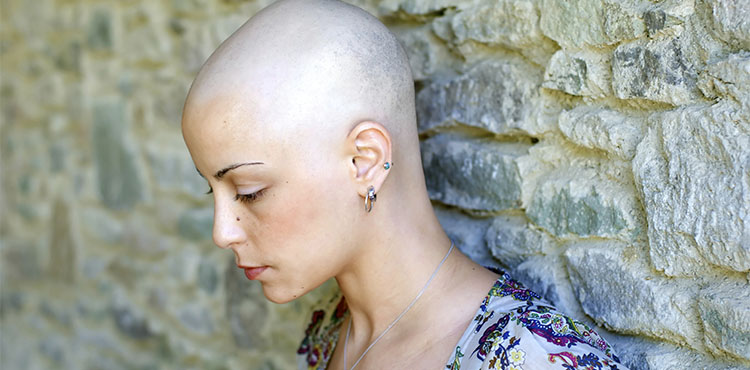Permanent hair loss is a dangerous side effect associated with Taxotere (docetaxel), a known chemotherapy agent used to treat several forms of cancer. Although temporary alopecia is a common side effect of some medications in this group, many patients treated with this taxane faced serious distress when their hair never grew back even after years.
 gyasemin/istock/thinkstock
gyasemin/istock/thinkstock
What is Taxotere and How Does It Work?
Taxotere is a form of chemotherapy approved for the treatment of several different types of cancers, including the following:
- Breast cancer
- Prostate cancer
- Advanced adenocarcinoma
- Squamous cell carcinoma of the neck or head
- Non-small cell lung cancer
It can be used alone or in combination with other antiblastic medications, depending on the type and stage of the malignancy being treated.
Docetaxel belongs to a class of drugs called taxanes, chemical compounds originally derived from plants of the genus Taxus (yew tree). It works by targeting microtubules, a part of the cell that promotes growth and division. By interfering with cancer cells ability to divide, the drug halts the growth and spreading of malignant cells in patients.
The Potential Side Effects of Chemotherapy
According to BreastCancer.org, a woman’s risk of developing breast cancer at any point in her lifetime is about 12 percent. When the tumor is detected early on, or even if it is found to be in its late stages, chemotherapy drugs administered orally or through an IV are generally considered one of the most common and effective forms of treatment. Many different medicines exist on the market, and it is not unusual for a patient to be prescribed several at the same time. Adriamycin and Taxotere is one of these common drug combinations.
The side effects of a chemotherapy regimen like this may include gastrointestinal upset, vomiting, mood swings, anemia, shifts in nail appearance and changes in hair. These changes may occur in color and texture, until hair thin or fall out as drugs build in the body. In due time, however, they will grow back and return to their original status.
The Cancer Institute suggests that some of the most effective ways of dealing with alopecia are expressing one’s true feelings about the hair loss, being proactive about shaving one’s scalp or cutting one’s hair short before the hair loss begins and showing one’s head and hairline gentle care techniques to ensure that the loss is as minimal as possible.
What is Alopecia?
According to Medical News Today, there are three kinds of alopecia, a medical term used to define hair loss. The most severe form is known as universalis, an autoimmune disorder that causes every hair on the person’s body to falls off. The next form is named totalis, and affects all the hair on the head, while the least serious form is alopecia areata, which is identified by missing patches of hair on the scalp.
Docetaxel and Permanent Hair Loss
Although temporary hair loss may be a possible side effect of chemotherapy or radiation therapy, complete and permanent alopecia is not. Hair should slowly regrow over the course of 6-12 months, but many patients treated with docetaxel found that their baldness was, indeed, irreversible.
In a recent study published in the Annals of Oncology, researchers found that 20 women who underwent chemotherapy using Taxotere suffered from a severe form of this condition, losing their scalp hair, eyelashes, eyebrows and other body hair. Though the study was small, its findings were significant.
Data from the 2014 National Cancer Research Institute Conference shows that in a study of individuals with early-stage breast cancer, 16 percent of patients treated with this drug experienced chronic alopecia as a result. According to the findings, it can be estimated that long-term hair loss might be a side effect in approximately 10 or 15 percent of patients treated.
The Taxotere handbook available on BreastCancerCare.org states that this medication causes hair loss, but that the hair should grow back within weeks after stopping treatment. However, the text now notes that irreversible baldness is a potential side effect in some cases. Many anecdotal reports of permanent hair loss, however, can be found on forums and other websites.
Is Taxotere the Only Option to Treat Cancer?
BreastCancer.org states that it is important to note that Taxotere is not the only option for chemotherapy treatments in those with early-stage cancer that has moved into the lymph nodes. There are several other taxanes available on the pharmaceutical market, such as Abraxane (paclitaxel).
On top of that, docetaxel itself is not always the most effective choice in all subjects. Cancer patients should consult with their care provider to determine which of the several varieties of taxane drugs might be best suited to their particular needs.
Did Sanofi-Aventis Knew About Irreversible Alopecia?
According to CBS News, a study found that hair loss occurred in 6.3 percent of patients treated with antiblastic drugs, which would classify it as a frequent side effect. However, prior to 2015, Sanofi-Aventis, the company that manufactures Taxotere, may not have adequately disclosed information about the potential risks that could lead to irreversible alopecia.
It is being alleged that this side effect has affected some patients in a way that has left them unable to regrow their hair through any type of treatment. The pharmaceutical company acknowledged in 2008 that they were aware of some form of permanent baldness associated with docetaxel. However, it wasn’t until December of 2015 that they began placing a warning label on the product, according to the FDA.





